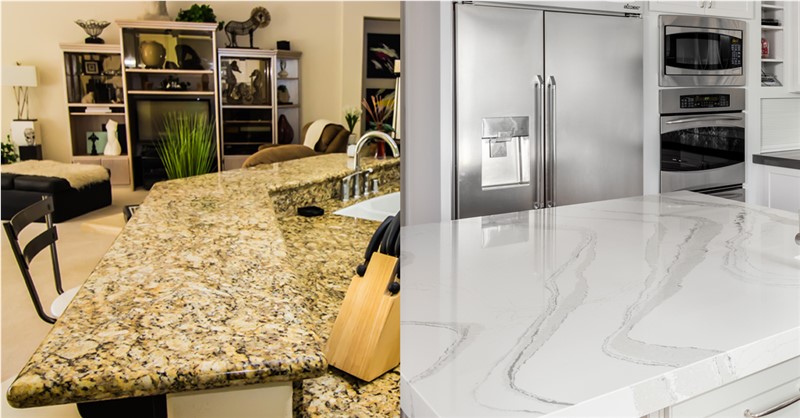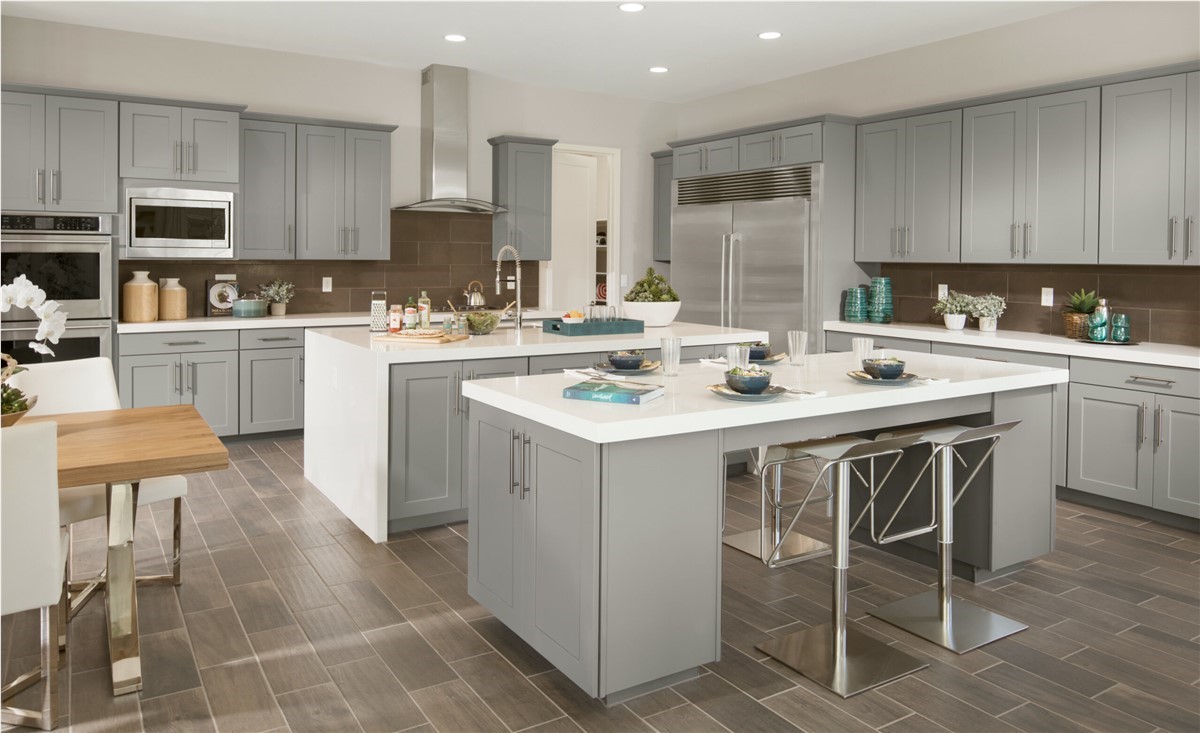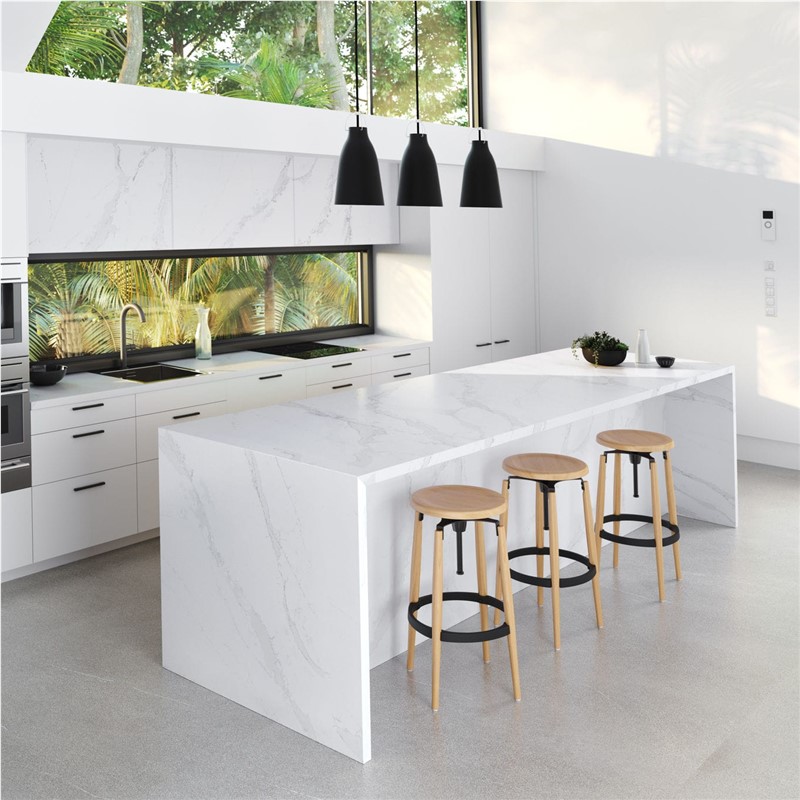Granite vs. Quartz Kitchen Worktops

It’s finally time to replace the kitchen worktops, but you don’t know what material to pick. Learn what to know about granite vs. quartz kitchen worktops here!
First off, congrats on deciding to install a kitchen countertop. So, now that you’ve made your decision, you’re probably wondering which countertop to get. You’ve narrowed it down, and it’s between granite or quartz. So how do you choose? Granite’s more natural. But quartz is less porous. Granite’s more unique. But quartz requires less maintenance. You could go back and forth and give yourself a headache. Which is why we’ve done the work for you, and have provided you with this list of comparisons when it comes to granite and quartz kitchen worktops.
1. 100% Natural
Yes, in a world filled with organic, vegan-friendly, and non-GMO labels, we are all about the 100% natural. Which is one of the reasons people put some serious consideration into granite worktops. This igneous stone is 100% natural. Yep, it’s mined around the world, cut, and polished. 100% natural also means no granite countertops will look alike. It’s unique. Since it is natural, there are bound to be imperfections (fissures), which is part of its charm and beauty. You still can choose a variety of colors, bold and muted: white, black, gray, red…yes, even pink. Patterns include: veined, speckled, and dotted to name a few. There is a dark side to being 100% natural, as granite is easier to chip and is more porous than quartz. It also requires a lot of energy to extract and transport it, especially when you want one of those beautiful slabs from Italy. This does make it not a great environmentally conscious option. However, is granite really the better of two beauties?
2. Quartz is a manufacturer’s best friend
Since quartz kitchen worktops aren’t all natural (93% quartz and 7% polymer resins) and are manufactured, it is more environmentally friendly compared to its natural twin. This is especially the case when the quartz countertop is regionally manufactured and locally fabricated. This also makes it more durable and harder—(let’s say Super Man would have a hard time breaking it). Please note it does damage with excessive heat, but it can withstand up to 400 degrees Fahrenheit. Because it’s less porous, it is more resistant to bacteria and mold. As of now, it may sound like we’re leaning towards quartz as the winner, but there’s still more groundwork to cover. While quartz has all of these great benefits, it still will never look as natural as granite. Sure, you have a greater color selection (since it is manufactured), but there won’t be that unique, imperfect, character that draws people to granite.
3. Ok, what about sealing?
Now, there is the maintenance. Once the quartz countertop is installed, it doesn’t require any re-sealing. Granite, on the other hand, should be re-sealed once a year. So, there is some maintenance when it comes to a granite countertop compared to a quartz kitchen worktop.
4. Speaking of which, how do you know when it’s time to re-seal?
Do the water test. Splash a couple drops of water on your granite countertop (if you did decide to choose that one). Notice the beading or lack thereof. If the water drops beads, it still is sealed and you can wait a bit longer before you need to re-seal it. If it doesn’t bead—looks like you need to call up a professional to get it re-sealed.
5. What granite and quartz kitchen worktops both need
Other than love, these countertops need to be cleaned daily. You can use soap and water for both. But, when it comes to granite, be weary of using common dish soap. Because it is slightly more porous than quartz, the dish soap over time will get trapped in the slab, resulting in buildup and diminished shine. This can, of course, be repaired. But, by using a cleaning spray specifically designated for stone surfaces, you can prevent this from happening. The spray goes for quartz too. If you’re out of the spray, do a bit of research first before you buy the next generic multipurpose spray on aisle five of your local grocery store. This pertains specifically to granite, as your common household bleach, degreasers, and glass cleaners have acids, alkali, and other harsh chemicals you don’t want to mess with. These will easily strip the seal off your granite countertops, which means more money out of your pocket. And, sad to say, even if you do opt for a more natural multipurpose spray, thinking it won’t do any damage, think again. Vinegar, ammonia, lemon and orange cleaners degrade that granite top too (as well as other stone countertops). So, research goes a long way. Also when cleaning, use a soft sponge or cloth. Both materials are very hard and can withstand knife blades, however, why take the chance and scratch it. Using soft cleaning fabrics makes your countertop last longer and requires less maintenance. This damage prevention extends to hot pots and pans. Yes, granite and quartz can withstand some high heat, but don’t test them repeatedly, unless you want quicker wear and tear. Use trivets and hot pads when resting hot pots and pans on the countertop. This goes for cutting boards as well. We’ve mentioned both surfaces can take sharp blades, but eventually (especially with granite being a natural stone), you’re going to get some damage. You can mitigate that future damage by making the habit of using a cutting board.
The moment is finally here… Is it a granite or quartz kitchen worktops?
And the winner is…your preference!
If you are in love with an all natural look and don’t mind spending on the occasional maintenance, granite is your go-to.
If you have a busy kitchen, where there’s always something going on, quartz kitchen worktops are your best choice.
So, which one would you choose? We want to know.
Be sure to contact us if you have any questions, comments, or concerns.
Subscribe to America's Dream HomeWorks's Blog





Comments